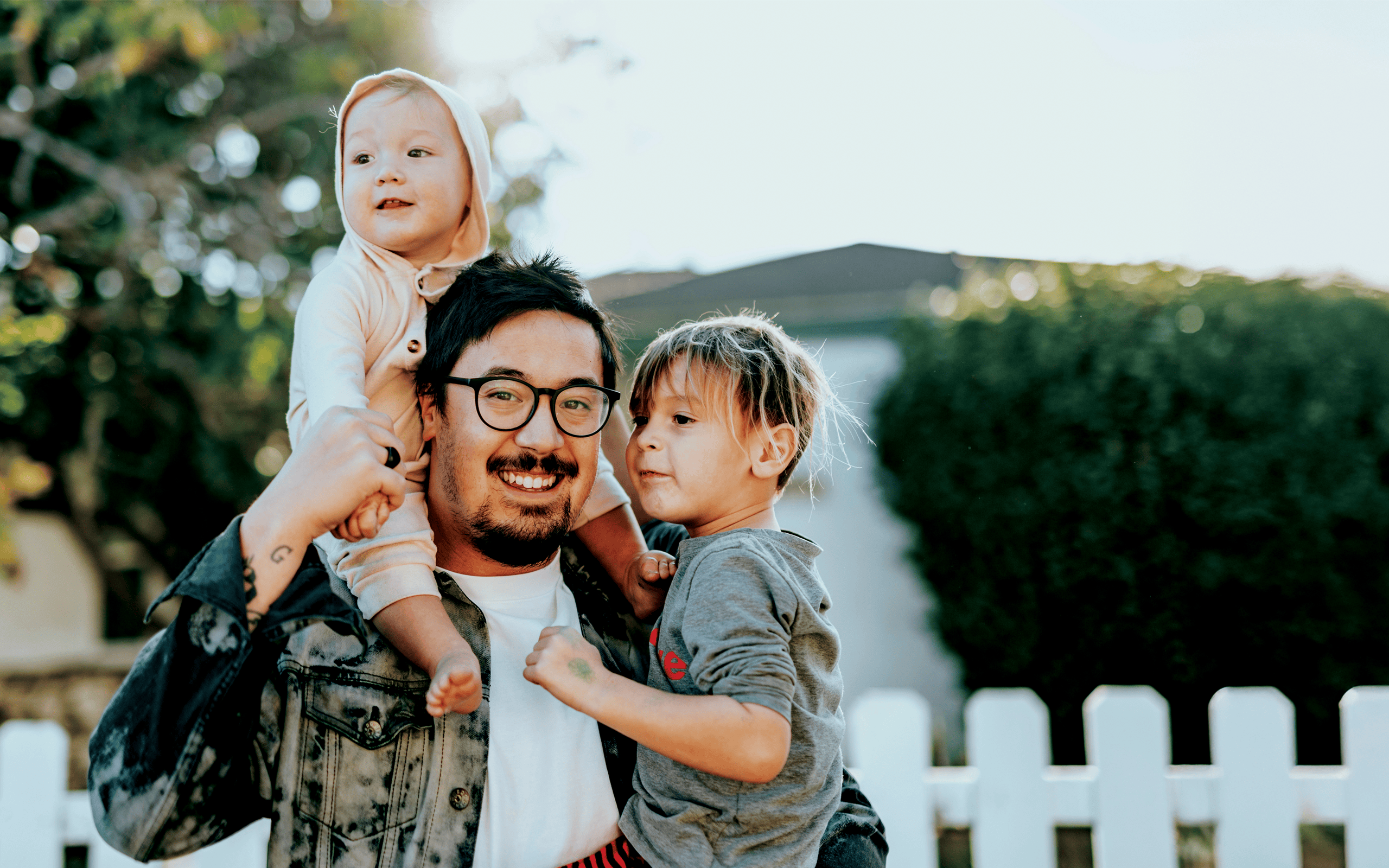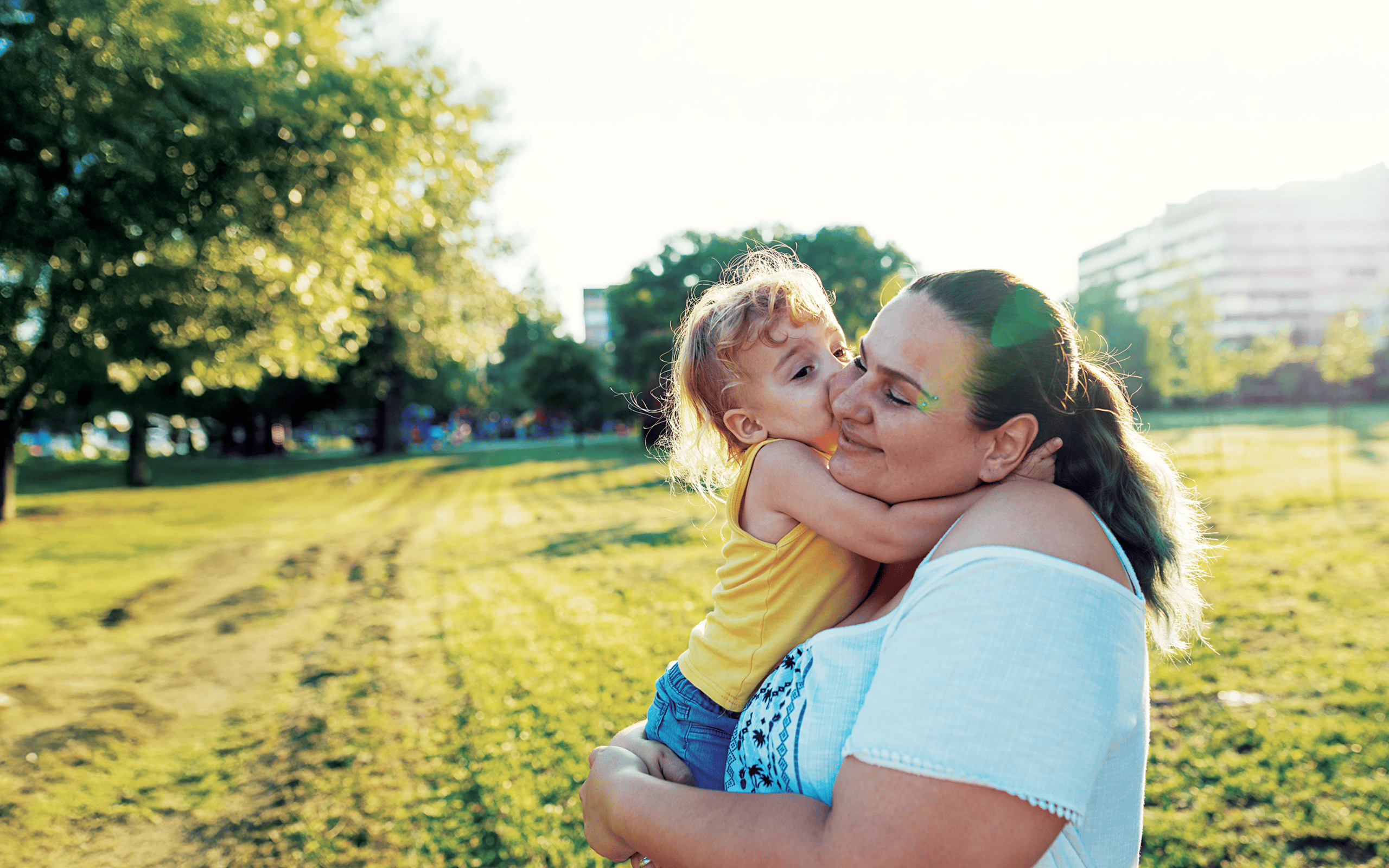Stabilizing Families to Improve Health and Wellbeing
How Lutheran Services in America is Building on a Strong Foundation for Future Impact
Key Takeaways
- Lutheran Services in America (LSA) has an established history of driving changes in practices, policies and systems that strengthen children and families and promote racial and health equity.
- The Results Innovation Lab (the Lab) is an LSA initiative that brings together leaders of over 50 LSA member organizations—faith-based health and human services providers—in a collaborative learning environment to foster partnerships and to develop innovative, data-driven solutions for complex social issues. Historically focused on at-risk youth and families facing systemic barriers, the Lab continues to be a steadfast driver of improved outcomes.
- The Family Stabilization Initiative (FSI), a cornerstone of the Results Innovation Lab, provides holistic and family-centered supports and services (wraparound services) to children and families, and has resulted in measurable improvements in child welfare outcomes.
- LSA’s history of successfully supporting its member organizations with a holistic approach to health and wellbeing has built a strong foundation for future impact.
- Building on this foundation, LSA and its member organizations are leveraging partnerships with local and national stakeholders, along with other health and human services providers, to have an even greater impact on the broad range of issues that affect child and family health and wellbeing. A prime example is the current work of LSA member organizations to improve behavioral health services for Medicaid beneficiaries in their communities by addressing health-related social needs including housing, transportation and nutrition.

Background: Lutheran Services in America
Lutheran Services in America (LSA)–the 19th largest charity in the country–is rooted in a century-long faith tradition of service in, with, for and to the community. Through its nationwide network of more than 300 independent faith-based health and human service providers, LSA works in 46 states, Washington, DC and Puerto Rico, and reaches six million people annually: 1 in 50 people in America, in 1,400 communities, with more than 250,000 dedicated employees.
With a commitment to whole-person, whole-community care, LSA utilizes its national member network to identify emerging policy and practice trends, make targeted investments to test innovative approaches, assess opportunities for scaling successful initiatives, evaluate outcomes and share best practices with stakeholders across the health and human services sector.
This expansive, nationwide network of member organizations, partners and funders serves diverse populations by developing innovative programs that address a wide range of needs:
- strengthening families and driving equitable outcomes for children and youth
- supporting the dignity, independence and choice for older adults
- connecting affordable housing and support services to those in need
- championing full and meaningful lives for people with disabilities
- fostering stability and purpose for veterans, refugees, new Americans and more
LSA catalyzes innovation, strengthens organizational capacity, amplifies a united faith-based voice, addresses health disparities and drives transformational social sector change on behalf of its members and communities.
Through collaborations with network member organizations, as well with leaders in healthcare, philanthropy, academia and business, LSA is one of the nation’s leading organizations advancing solutions and driving systemic change to enable all people in America to lead their best lives.
The Results Innovation Lab: An Incubator for System-wide Solutions
LSA’s work to drive changes in practices, policies and systems is conducted primarily through its Results Innovation Lab (the Lab). LSA created the Lab in 2016, in partnership with The Annie E. Casey Foundation, to develop innovative, data-driven and system-wide solutions for addressing complex health and social issues facing LSA member organizations’ communities across the U.S.
Prior to LSA creating the Lab, member organizations varied in their ability to adapt to policy changes and organizational challenges in the health and human services sector. The Lab was established to bring leaders of these organizations together for in-person collaborative learning to identify trends, discover partnership opportunities and implement evidence-based solutions among their communities.

The Lab fosters a ripple effect within the LSA network, with LSA members disseminating the Lab’s adaptive strategies to their colleagues and community partners, further amplifying the Lab’s impact.”
The Lab employs a comprehensive collaborative learning model, enabling LSA member organizations to engage in interactive training, foster stakeholder relationships and share best practices to improve outcomes for individuals and families in their communities. To date, more than 50 organizations across 30 states have participated in the Lab’s various cohorts.
Each cohort’s curriculum is tailored to its specific needs; lab participants identify the key challenges within their communities, acquire the tools and strategies they need to drive change and use data-driven methods to measure their progress and impact.
Recognizing that community-based health and human services providers play a critical role in the welfare of children and their families, the Lab, since its inception, has had a particular focus on issues related to child welfare and racial equity. It has, for example, prioritized specific outcomes such as reducing the lengths of time children of color stay in foster care, thereby decreasing the disproportionate number of children separated from their families. In 2023, the Lab reached 15,788 children and families in the U.S. for a total of approximately 50,000 since the Lab’s inception.
LSA members have taken lessons learned in the Lab back to their organizations to help prioritize investments in skills and cultural competency training, staff retention, equitable outcomes, and funding/partnership development. This is an example of how the Lab fosters a ripple effect within the LSA network, with LSA members disseminating the Lab’s adaptive strategies to their colleagues and community partners, further amplifying the Lab’s impact.
The Results Innovation Lab’s Early Success: Redefining Relationships Between Adults and Youth in Foster Care
During the first cohort of the Lab in 2016, LSA encouraged participants to reevaluate their definitions of key child welfare concepts, such as “permanency” and the preservation of healthy child and family relationships/placements. Cohort leaders proposed shifting the focus from legal permanency to creating lasting relationships between youth and adults. This shift prompted LSA member organizations to explore innovative solutions such as reconnecting youth with extended family and engaging community partners in improving permanency rates among children of color. As a result of the mind set shift, participants reported increased permanency rates for children of color, reduced length of stay in foster care and improved outcomes for youth transitioning out of the child welfare system. For example, Lutheran Child and Family Services (LCFS) of Illinois facilitated permanent placements for 338 Black and Latino children, following LCFS’ engagement with the Lab.
The Lab's Family Stabilization Initiative: Transforming Families Through Evidence-Based Care
A cornerstone of the Results Innovation Lab, the Family Stabilization Initiative (FSI), provides holistic and family-centered supports and services (wraparound services) to children and families. This transformative program, launched in 2021, focuses on stabilizing families in crisis to improve equitable outcomes. FSI brings together four key service agencies from LSA’s member network based in Alaska, Montana, South Dakota and Washington, along with nearly 80 local community partners.
The CARES initiative (Coordination, Advocacy, Resources, Education and Support and WISe model (Wraparound with Intensive Services) assess family strengths and create individualized care plans to enhance family functioning while mitigating risks to child and family wellbeing. They also employ a holistic, team-based strategy that ensures Medicaid-eligible youth receive the intensive services necessary for their wellbeing and safety. This collaborative, combined with other efforts and technical assistance from the National Center for Innovation & Excellence (NCFIE), taps family’s strengths, enhances community bonds and creates safer environments for children.

The CARES initiative and WISe model assess family strengths and create individualized care plans to enhance family functioning while mitigating risk to child and family wellbeing.”
As it is an initiative within the Lab’s successful framework, collaborative learning is central to the FSI, fostering strong relationships among participants, encouraging the exchange of best practices and enabling collective problem-solving. Beyond service delivery, the FSI seeks to cultivate leaders from LSA member organizations who are committed to advancing racial equity and applying FSI principles for long-term program sustainability. By fostering peer collaboration and embedding racial equity principles, the FSI provides a comprehensive, sustainable approach for human service organizations to implement and maintain high-quality programs that support families and strengthen communities.
The FSI cohort advances equity by providing comprehensive crisis support and care planning, skill development and an emphasis on referrals of children of color in the child welfare system, including those dealing with complex mental health or substance use issues. Participation in the Lab and FSI strengthened members’ capacity to advance equity and foster leadership in wraparound service delivery that supports both children and their families who are dealing with behavioral health challenges.

A Strong Foundation for Future Impact
The historical success of LSA to catalyze and strengthen the work of its member organizations has resulted in a powerful nationwide network with expanded capabilities to address the most complex challenges to health and wellbeing facing America’s communities.
Lab Benefits to Member Organizations
Recent interviews with LSA member organization leaders engaged in Lab initiatives confirms that the Lab transforms and strengthens organizational capacities that support families and improve child welfare outcomes. All interviewees noted that the Lab provides an essential foundation that equips LSA members with tools and frameworks to implement equity-focused, results-based leadership strategies, which have shifted the mindset and operations of various LSA member organizations and which all interviewees highly recommended to other LSA members.
In 2023, LSA commissioned an evaluation to assess the effectiveness of the Lab’s FSI in improving collaboration and member organizations’ efforts to transform the child welfare system. The evaluation focused on how FSI’s collaborative learning model strengthened the capacity of four participating LSA member organizations to provide wraparound support and services to families—with a focus on families of color—in Alaska, Montana, South Dakota and Washington.

The Lab transforms and strengthens organizational capacities that support families and improve child welfare outcomes.”
- Improved Equity
- Ninety-two percent (92%) of participants reported taking time to reflect on their own biases, showing that engagement with the FSI helped drive significant progress in the understanding of racial equity. Sixty-two percent (62%) said they understood the impact of systemic racism on families of color.
- More Effective Leadership
- Eighty-five percent (85%) of participants reported that their involvement in the FSI enhanced their results-based leadership skills and contributed to their professional growth.
- Better Connections
- The FSI’s learning collaborative model strengthened connections between the member organizations and external agencies; organizations partnered with 80 agencies over three years, far surpassing LSA’s initial goal of 12.
- Increased Sustainability
- Seventy-seven percent (77%) of teams reported that participation in the FSI enhanced their ability to deliver and maintain the CARES/WISe wraparound services.
- Stronger Commitment
- The collaborative reinforced participants’ capabilities in prevention-based and family-centric services, with most participants agreeing strongly with questions about empowerment, the flexibility of services, the value of family wisdom and the positive impact of the wraparound model.
Strengthening Outcomes of Member Organizations' Efforts
The transformative practices shared with LSA members through the Lab have been integral to improving individual and community outcomes. Based on qualitative interviews with participating organizations in 2024, LSA’s holistic approach to developing innovative, system-wide solutions has enabled LSA member organizations to address a range of focus areas. Those areas have direct impacts on whole-person, whole-community wellbeing, such as improving crisis interventions and behavioral health, providing communities with stable and safe housing and nutritious food, and more.
Overall, the Lab’s outcome-based models have catalyzed mindset and culture shifts within LSA member organizations. It has fostered collaboration and data-driven decision-making, particularly in identifying racial disparities.

The Lab transformed the way we think about our work by informing an outcomes-based strategic plan that is now integral to our operations.”
For example, the Lab and FSI have transformed the Lutheran Social Services (LSS) juvenile justice and child welfare approach in South Dakota, advancing equity by strengthening community-based services for justice-involved youth. This includes the addition of Functional Family Therapy to LSS’s behavioral health services, an intensive, short-term therapeutic model that provides in-home family counseling to specifically address juvenile delinquency. A key achievement of the Lab was supporting LSS in disaggregating its program data by race for the first time, helping LSS identify disparities in their service population.
Similarly, the Lab has supported Lutheran Child and Family Services (LCFS) of Illinois’ efforts to focus on tracking disparities among children of color in foster care. One organizational leader highlighted how cohort discussions placed a newfound emphasis on fathers’ involvement in child welfare cases, which had previously been overlooked. This shift enabled LCFS to take a more inclusive approach to family dynamics and address gaps in its services.
LSA members continue to innovate and provide exceptional care to individuals and families in need, even in the face of external challenges. Among these challenges are the lack of Medicaid expansion in some states, limitations in state uses of federal child welfare funding and administrative complexities in billing Medicaid for key services—pointing to the importance of future advocacy efforts.
LSA members are continuously striving to overcome these challenges, by working with state and local partners, by learning from other community-based organizations that have faced similar obstacles—and by partnering directly with Medicaid Managed Care Organizations.

The Lab supported a South Dakota organization in disaggregating its program data by race for the first time, helping it identify disparities in their service population. It also enabled an Illinois organization to take a more inclusive approach to family dynamics and address gaps in its services.”

Leveraging Partnerships to Improve Health and Social Outcomes
With documented, measurable outcomes and a solid foundation for future impact, LSA and its member organizations are taking on new challenges and partnerships, including partnerships with Medicaid Managed Care Organizations (Medicaid MCOs) both locally and at the national levels. For example, several of LSA’s members are working with Medicaid MCOs to enhance the delivery of behavioral health services through various initiatives. This includes demonstrating significant progress in leveraging Medicaid reimbursement to support behavioral health services across several states, setting promising examples for future Medicaid reimbursement strategies across the LSA national network.
Billing Medicaid for Child Welfare Services
In Washington, the state’s Medicaid program covers WISe wraparound services for youth, ages 20 or younger, with complex behavioral health needs. Lutheran Community Services Northwest provides WISe services, including a team-based, collaborative approach that tailors care to the needs of the family in question to reduce unnecessary out-of-home placements. Furthermore, LSS South Dakota and St. John’s United in Montana are successfully billing Medicaid for eligible behavioral health and child welfare services, including those supported by the CARES initiative. LSS South Dakota received a family stabilization grant from LSA in 2021 to implement the CARES model in Watertown and Sioux Falls. This evidence-based initiative aims to prevent families from entering the child welfare or juvenile justice systems by identifying at-risk families early and providing them with a dedicated case manager and family advocate, offering comprehensive support, including referrals and skill development to help navigate crises.

The Promise of Future Impact
The success of Lutheran Services in America’s Results Innovation Lab is rooted in its ability to adapt to changing circumstances and to its emphasis on building a community of trusted leaders who support one another through the transformation process. The Lab has played a pivotal role in helping LSA member organizations navigate crises, such as the COVID-19 pandemic and the national reckoning on race after the killing of George Floyd. The Lab’s focus on racial equity has been instrumental in driving organizational changes, including the disaggregation of program data by race, the identification of systemic biases, lifting up the voices of those with lived experience and implementing targeted strategies to improve outcomes for children of color.
LSA leaders know that the Lab—through continued partnership with colleagues in healthcare, philanthropy, academia and business—can successfully help member organizations adapt to ongoing and future societal and sector shifts including furthering value-based payment models.
LSA’s commitment to systems change and the potential for future impact is further demonstrated by LSA achieving its 2024 Moonshot Goal—improving the trajectory of 20,000 children, youth and families—a year early. This accomplishment reflects LSA’s broader vision of shifting child welfare from intervention to prevention, as supported by the Family First Prevention Services Act. By leveraging its resources and expertise, LSA is now building on this work. Innovative programs like the Lab and the FSI are enabling LSA to facilitate the transformation of the lives of children and families by leading the national effort to create a more just and equitable child welfare system, while at the same time improving health outcomes.
Next up: A Deeper Look at LSA Member Organization Approaches
The next issue briefs will provide more detail into the innovative approaches that LSA member organizations are implementing, partnering with Medicaid MCOs to improve health and behavioral health outcomes for children and families.
About this Project
Lutheran Services in America (LSA), in partnership with United Healthcare (UHC), is embarking on a multi-year initiative to reshape and foster alignment between health and social care systems to strengthen families. The Strengthening Families initiative aims to improve outcomes for children, youth and families enrolled in Medicaid, with an initial focus on behavioral health conditions.
Acknowledgments
Special thanks to Katie Horton, JD, RN, MPH, Naomi Seiler, JD and Aaron Karacuchansky, MHP at the Department of Health Policy and Management, Milken Institute School of Public Health at George Washington University for their research and contributions to make this brief possible; to Antonio Oftelie, Harvard John A. Paulsen School of Engineering and Applied Sciences; Beverly Jones, Lutheran Child and Family Services of Illinois; Rebecca Kiesow-Knudsen, Lutheran Social Services of South Dakota; and Kathryn Parker, National Center for Innovation and Excellence for their time and contributions in support of this effort. Thanks also to John Capecci of Capecci Communications for his efforts in narrative framing to support the development of this issue brief.
Resources
- Lutheran Services in America. (2022). Disruption is in our DNA. https://lutheranservices.org/disruption-is-in-our-dna/
- Transforming Congregate Care A White Paper on Promising Policy and Practice Innovation. (2021). Lutheran Services in America. https://lutheranservices.org/wp-content/uploads/2022/05/Final-Transforming-Congregate-Care_Oct_2021.pdf
- Results Innovation Lab Informs—and Challenges—Beacon Award Winner Rebecca Kiesow-Knudsen to Improve Results. Lutheran Services in America. (2021). https://lutheranservices.org/results-innovation-lab-informs-and-challenges-beacon-award-winner-rebecca-kiesow-knudsen-to-improve-results/
- Child Welfare Information Gateway. (2023). Family First Prevention Services Act. Children’s Bureau. https://www.childwelfare.gov/resources/family-first-prevention-services-act-pl-115-123/
- Annie E Casey Foundation. (2017, April 17). Lutheran Services in America advances measurable results for kids. https://www.aecf.org/blog/lutheran-services-in-americaadvances-measurable-results-for-kids
- Aman, J., Goux, K., & Gerrard, M. (2022). Early impacts of the Family Stabilization Initiative. Wilder Research.
- The National Center for Innovation and Excellence (n.d.). C.A.R.E.S. Model and Replication. Retrieved October 6, 2024, from https://ncfie.org/what-we-offer/c-a-r-e-s-model-and-replication/
- South Dakota Annual Progress and Services Report 2024. The Administration for Strategic Preparedness and Response (ASPR). https://dss.sd.gov/docs/childprotection/apsr/ASPR_2024.pdf
- Reducing Risk: Families in Wraparound Intervention. (2015). Brevard C.A.R.E.S. https://ncfie.net/wp-content/uploads/2016/01/Bound-Reducing_the_Risk_Families_in_Wraparound.pdf
- Washington State Wraparound with Intensive Services (WISe) (2022). Service delivery, policy, procedure, and resource manual. Retrieved from: https://wisewc.com/#wiseinfo
- McCrae, J.S., Broxton, A.T., Steinmetz, S., & Casillas, K.L. (2023). Advancing Equitable Outcomes in Child Welfare: A Toolkit for Sustainability. Chapin Hall: University of Chicago.
- Hindery R.K. New approaches, extended services LSA sees success from Results Innovation Lab. Lutheran Services in America. https://www.lssmn.org/sites/default/files/2020-01/LSA%20Results%20Innovation%20Lab.pdf
- Addressing Racial Inequities in Child Welfare Systems: Lutheran Services in America’s Collaborative Learning Model Summary of Evaluation by Wilder Research of LSA’s Family Stabilization Initiative. (2021–2023). https://lutheranservices.org/wp-content/uploads/2024/01/LSA_WilderBrief_RacialInequities_r2.pdf